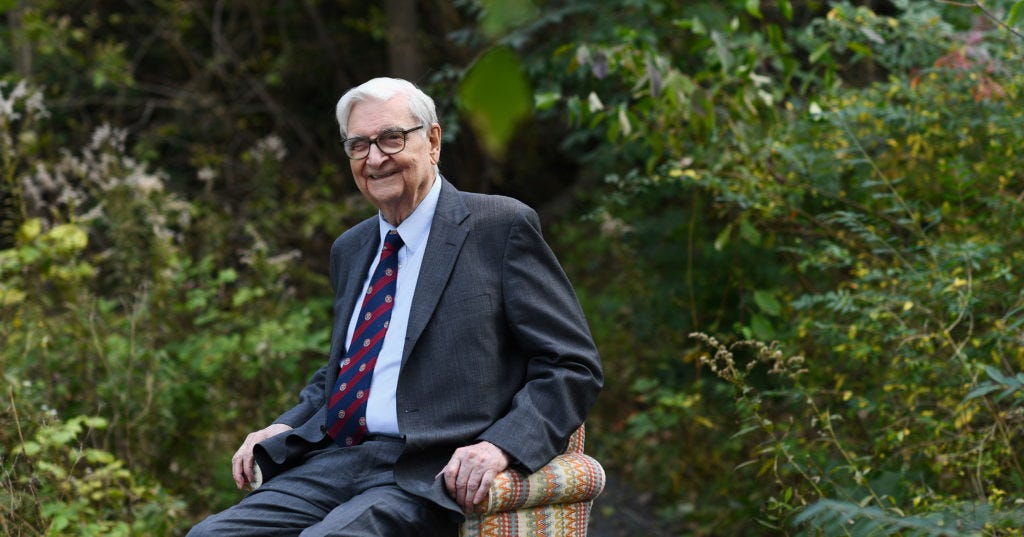A personal note
When E. O. Wilson died at the age of 92 last month, I mourned because his death was the destruction of a library. Many younger biologists who focus on mastering new statistical and computational methods lack the organismic knowledge that older generations accrued. Knowledge-loss is real, no matter how fondly we cling to our modern expectations of eternal progress. And then there is the loss to history, as Wilson had so much back and forth with other giants, from James Watson to Richard Lewontin. Older academics of his stature and vigor often alone retain insights and anecdotes that will disappear forever with their passing (for a vivid reminder of this truth, read this Alice Dreger interview of Wilson from 2009).
This was why Scientific American’s publication of The Complicated Legacy of E. O. Wilson frankly left me aghast. Even my deep cynicism about our age’s slackening standards did not prepare me for that op-ed. It seemed to have little to do with Wilson, and everything to do with opportunistically shoehorning particular views about social justice into the practice of hard science. Wilson was involved in many scientific debates and cultural issues, but since the fading of the 1970’s “sociobiology wars,” his prominence as a controversialist had become a footnote to his advocacy for conservation and his role in debates over the utility of the “inclusive-fitness” framework.
My immediate reaction was that the op-ed was indecent. It was muddled and uninformed at best, disrespectful and misleading at worst. Along with many others, I expressed this view on social media and began to hear from yet more who weren’t speaking publicly. I heard through the grapevine that multiple Scientific American staffers were embarrassed by the piece and was encouraged to submit a rebuttal. After a quick flurry of emails and direct messages, a few of us agreed this shouldn’t be allowed to stand without a rebuttal.
Other scientists of some stature shared our disgust, but disagreed; they felt a rebuttal to something so unworthy was beneath them. It would give Scientific American undeserved oxygen and attention. Engagement with a publication that to many seems to have lost its way risked being more reward than rebuke. To be candid, I felt their approach, probably perfectly standard in past decades, was wholly out of step with today’s dispensation, when attacks on science are legion, genuine fear of the social-media mob is rampant in academia and whole careers are “canceled” on a specious basis. Ignored long enough, the lie becomes canon.
It wasn’t difficult to find signatories to the rebuttal, and we could have collected hundreds. I stopped seeking names after a few dozen, because the message is abundantly clear when you see who signed. Dr. David C. Queller is one of the most prominent critics of Wilson’s late foray against Hamiltonianism. Dr. David Sloan Wilson and Dr. Jerry Coyne both signed without hesitation. In other circumstances, they have had some very pointed disagreements, but on this they concurred (Wilson, notably, was emphatic that we shouldn’t engage in “Great Man” hagiography on the podcast I recorded with him). Some of those who signed, no doubt share many political and social views with the author of the Scientific American piece. It’s not my place to speak for them, but some made clear their sincere political goals are not served by association with sloppy smear jobs.
Wilson was not without faults, as I highlighted in the podcast I recorded with David Sloan Wilson and Charles C. Mann. Many scientists I know and respect have expressed skepticism and dismissal of some of Wilson’s enthusiasms. Great scientists of the past are not gods any more than great scientists still among us, but humans, with all the complexity that entails.
Differences of opinion are nothing new in science. Sadly, baseless accusations of racism aren’t either. Wilson negotiated plenty of each throughout his long career. A single 1981 instance where he defended himself and his science in the magazine Nature provides a striking contrast to today’s case. In response to a letter published in a previous issue suggesting his work gives cover to racists, Wilson penned his own calm, patient response, addressing the accusations with facts. Nature ran both letters.
Today, after sitting on our rebuttal to Scientific American’s prominent reappraisal of Wilson for eight days (curious given that the original article was rushed out within three days of his death) editor-in-chief Laura Helmuth wrote to officially reject it. Scientific American avoids, she explained, “running direct rebuttals of earlier articles. This is a standard practice in most magazines to avoid being too self-referential, and so each article stands on its own.”
Most of us can vividly recall a time when both journalism and science were robust enough to welcome, indeed require, the healthy airing of debates on important issues. Today, in contrast, contributors to a publication once dedicated to the diffusion of scientific ideas are deemed so sensitive their opinions cannot be directly discussed or debated. Not only that; their unvetted, ad hominem attacks are automatically newsworthy, based, one gathers, on the logic behind He




